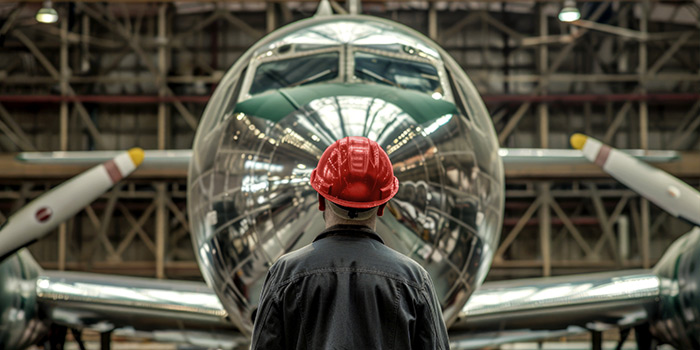The Workforce Challenge in the Aviation Industry: Bridging the Talent Gap
03 Jan 2025
Highlights:
As the aviation industry soars forward, a looming challenge waits on the horizon: a critical workforce gap that could disrupt its path to growth, operational efficiency, and technological advancement. The industry faces an urgent need to recruit, develop, and retain skilled professionals across a broad spectrum of roles, from pilots and engineers to air traffic controllers and maintenance technicians.

This challenge is amplified by both a wave of retirements and the rapid evolution of aviation technologies, demanding skills that are often scarce or still emerging. A proactive, collaborative approach is essential for sustaining the industry’s momentum and fostering a workforce that can navigate the demands of modern aviation.
The Retiring Workforce: Knowledge Gaps and Operational Challenges
As a significant proportion of the current aviation workforce approaches retirement age, industry leaders find themselves at a pivotal point. Almost half of the workforce in critical roles is expected to retire in the next decade, a mass departure that not only opens career opportunities for new talent but also poses a risk of substantial knowledge loss.
Skilled engineers, technicians, and seasoned professionals bring years of expertise, accumulated through hands-on experience and deep technical understanding. Their departure will inevitably create an experience gap that cannot be filled overnight. It is crucial for organizations to implement structured knowledge transfer programs to preserve the insights and skills of retiring professionals, bridging the knowledge gap through mentorship and cross-generational learning.
New Skill Demands: Bridging Traditional and Emerging Knowledge
Technological advancements, sustainability goals, and regulatory shifts are transforming the aviation landscape, and with them, the skills required. Emerging technologies like artificial intelligence (AI), machine learning, data analytics, and electric propulsion systems are reshaping aviation operations, demanding a workforce proficient not only in traditional aviation principles but also in cutting-edge innovations. Sustainable Aviation Fuel (SAF), electric aircraft systems, and AI-based optimization solutions, for instance, are rapidly becoming mainstream, and so too must the skills to manage and maintain them.
Research conducted between MIT and Delta Airlines, for example, highlights AI and data analytics' potential to optimize flight routes, reduce fuel consumption, and mitigate environmental impacts from contrails. This kind of knowledge, spanning both technical and environmental dimensions, is crucial as the industry seeks to balance safety and sustainability. Companies must therefore prioritize training initiatives that help professionals remain adaptable to such changes, offering continuous learning pathways that align with evolving industry requirements.
Recruitment Challenges: Shaping Aviation’s Appeal for New Generations
Attracting talent to the aviation sector has proven challenging, particularly as younger generations often perceive other fields, such as information technology or renewable energy, as more stable or innovative. Lengthy training processes, high initial costs, and regulatory hurdles for technical roles further deter potential recruits.
To address this, the aviation industry must actively promote its best qualities, emphasizing career stability, global impact, and technological innovation it offers. Building partnerships with educational institutions, establishing robust apprenticeship and internship programs, and showcasing aviation careers through media campaigns can make a difference in shaping aviation’s image as an industry of choice.
Retaining Talent: Developing a Culture of Growth and Inclusion
Securing talent is only one piece of the puzzle; retaining it is equally critical. Organizations must invest in continuous training programs that allow employees to adapt to technological shifts while advancing their careers. Establishing mentorship programs, where new hires can learn directly from seasoned professionals, is one effective way to transfer knowledge and foster engagement.
Creating a work culture that values diversity, equity, and inclusion can also enhance job satisfaction and loyalty. As younger professionals increasingly seek employers that align with their values, companies can benefit from nurturing inclusive environments that embrace varied perspectives and foster collaborative innovation.
Collaborative Solutions: A Unified Approach to Workforce Development
The aviation industry cannot address its workforce challenges in isolation. Collaboration among industry stakeholders, educational institutions, and government agencies is essential. Industry associations, for instance, play a crucial role in advocating for policies that support workforce development, such as funding for training programs and providing scholarships to aspiring aviation professionals. Educational institutions must also adapt their curricula to reflect industry shifts, offering hands-on experience with modern technologies to better prepare students for the aviation field.
Public-private partnerships and government support can be instrumental in expanding recruitment pools and widening opportunities for underrepresented groups. By investing in programs that combine work-integrated learning and academic studies, the aviation industry can broaden its talent pipeline while building an inclusive workforce prepared for the future.
Navigating a Transformative Era
Aviation is on the cusp of a transformative era, poised to benefit from advancements that promise greater efficiency, sustainability, and operational excellence. Yet, achieving these goals hinges on addressing the pressing workforce challenge. By tackling the talent gap through targeted recruitment, continuous professional development, and collaborative efforts, the aviation industry can cultivate a skilled, adaptable workforce capable of steering the sector forward.
This journey towards a robust and diverse talent pipeline is not just about sustaining the aviation industry’s growth; it is also about strengthening its commitment to safety, sustainability, and technological progress.
AviaPro Newsroom
+1 416-544-9969
info@aviaproconsulting.com

Editorial Contacts